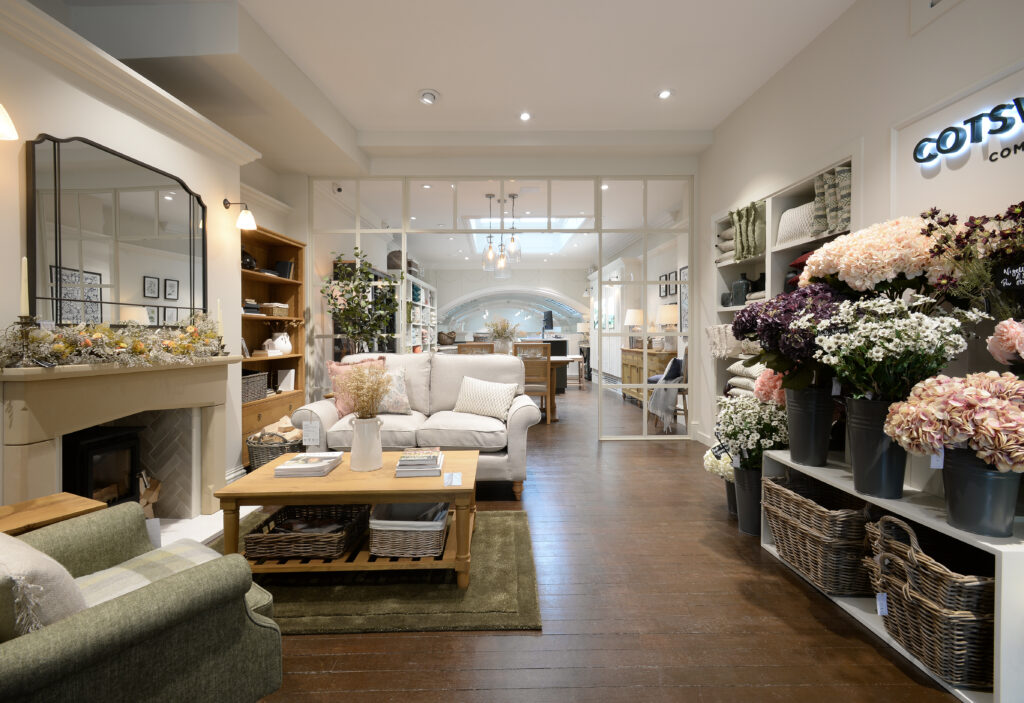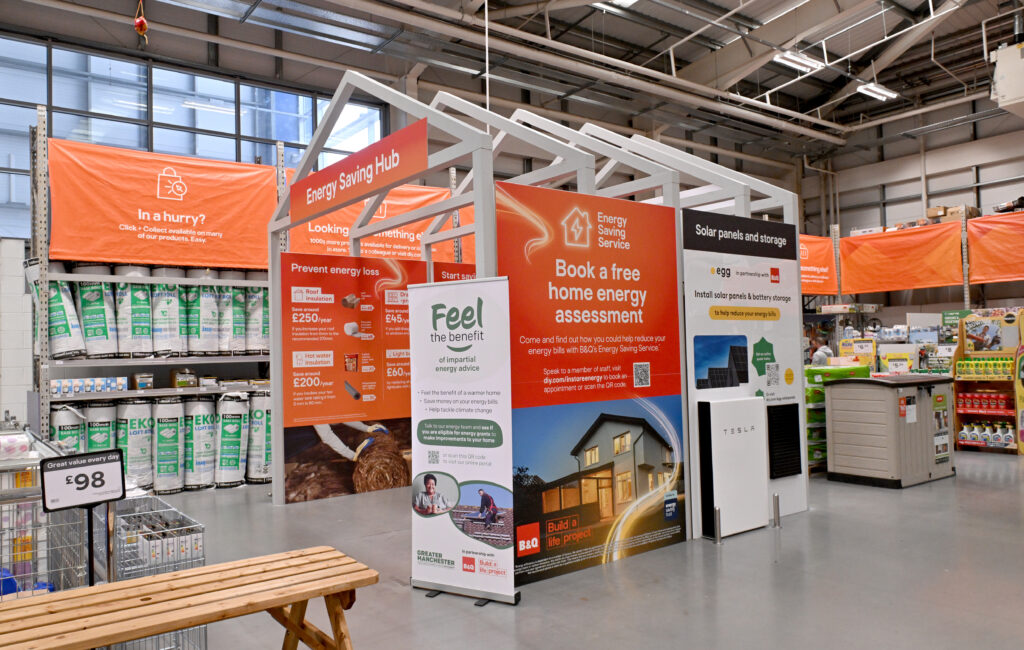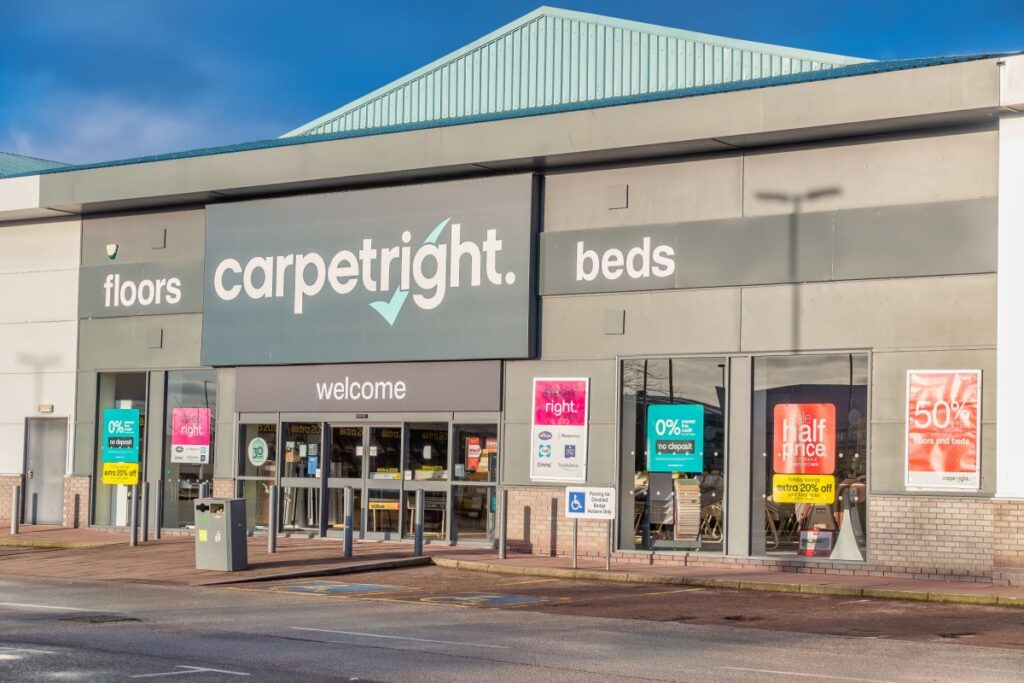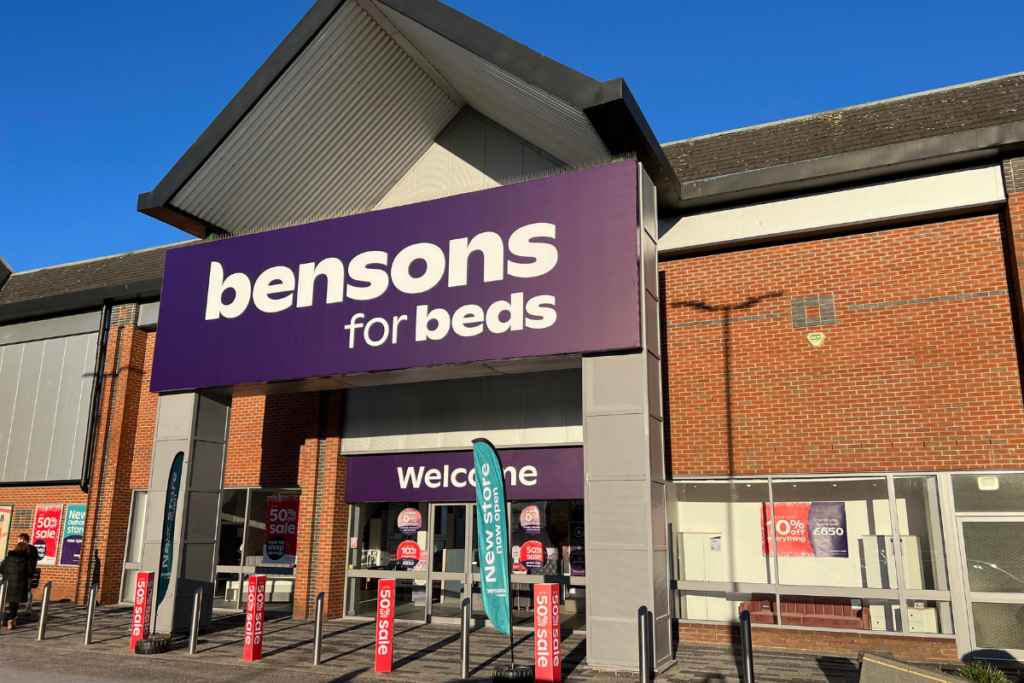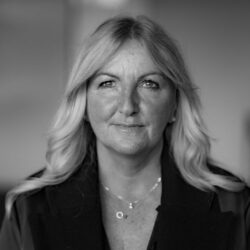Turning around an unprofitable business is no mean feat, but throw in a cost-of-living crisis where consumers have significantly pulled back on discretionary spend and that’s one steep hill to climb.
“They often say ‘fix the roof while the sun is shining’, we’ve had to fix the roof while the rain has been pouring through the ceiling,” says Bensons for Beds CEO Nick Collard.
The private equity-owned retailer revealed it had returned to profitability last month for the first time since its collapse in 2020, as EBITDA hit £1.5m in the 53 weeks to 30 September, up from a £15.4m loss in 2022.
“Businesses can often cope with one event but we’ve had two things going on,” explains Collard, pointing out that consumer confidence remained largely subdued for most of last year as Bensons sought to return to growth after its pre-pack administration.
The furniture retailer along with sister company Harvey’s fell into administration in July 2020, less than nine months after it was bought by Alteri Investors, as the effects of the coronavirus placed pressure on the business’ supply chains and customer sales. The private equity firm bought back Bensons but not Harveys.
Collard, a former digital boss at DFS, Holland & Barrett and Morrisons, was promoted from his chief digital and commercial officer role to CEO in June 2022 to accelerate Bensons for Beds’ transformation and investment in omnichannel.
His plan has worked and its “investment in good cost and reduction in bad cost” is clearly garnering results.
Collard’s approach is vastly different to many other retail bosses that have sought to strip costs from businesses, as they batten down the hatches and hope for the market to improve.
“The primary focus for us has been investing in good cost as a way of driving our recovery rather than just stripping costs out, which for me is never a long term sustainable solution certainly not for business like ours,” he says.
“We’ve got a real sort of entrepreneur culture developing in the business where we’ve spent every pound as if it was our own.”
Stores, staff and service
Last year, Bensons’ core focus was expanding its store network, training and supporting staff, as well as improving the overall customer experience both online and post-purchase.
“The biggest investment financially has been in terms of the expansion of our store estate,” explains Collard.
The retailer has opened 14 new stores in the last 12 months, including returning to locations like Peterborough and Speke in Merseyside, and entering new catchments such as Edinburgh Craigleith.

As the business focused on growing its presence, Collard notes he realised “we weren’t investing enough in terms of our store colleagues or delivery drivers”.
“The starting point was if we did the right things for our colleagues, we’d end up doing the right things for the business and I think that’s proven right.”
“If you look at one of the other biggest investments we’ve made, it’s actually been in training, pay and the overall package of our colleagues.”
The retailer launched a winter support package for staff last year, which paid out monthly payments to help colleagues alleviate cost-of-living pressures, and in January, implemented the national living wage increase for hourly paid staff ahead of its April start date and awarded all other roles a 5% bump.
Outside of stores and pay, Bensons has also built its online capabilities to make it easier for consumers to shop online – a move which contributed to 22% surge in digital like-for-like sales last year.
Collard says the retailer has been improving its website infrastructure and the quality of its brand assets “so digital imagery, videos, and the amount of information when you come to a product page”.
“In our sector, 90% of customers start their journey online and will often do a lot of research before they then come and try it in store and so, [the website] is your best advertising vehicle, your best shop window.”
Bensons’ online performance has also been boosted by its live shopping capability, which Collard says is increasing “at a fairly rapid rate” and is “probably the best channel that we’ve got” in terms of customer satisfaction.
Part of its web efforts have helped to grow its community database – what Collard terms “Bedheads” – which has grown from 25,000 to nearly 300,000 consumers in the last 18 months.
“We’ve got some really big ambitions for that in terms of how that adds different opportunities for those customers over time so that’s being developed over the next six to 12 months.”
Collard lets slip that some of the developments including providing its ‘Bedheads’ database with inspirational content, advice and early access to new brand and product launches.
Eve Sleep: A ‘complementary’ acquisition
Bensons’ acquisition of Eve Sleep after its collapse at the tail end of 2022 was another “positive profit contributor” last year, says Collard.
“We’ve been able to retain the vast majority of sales that the business had prior to going into administration, improve the customer satisfaction ratings, and take the brand to quickly make it a positive profit contributor to our organisation,” he says.
The retailer, which paid £600,000 for the mattress company, relaunched the online brand within weeks of the deal completing.
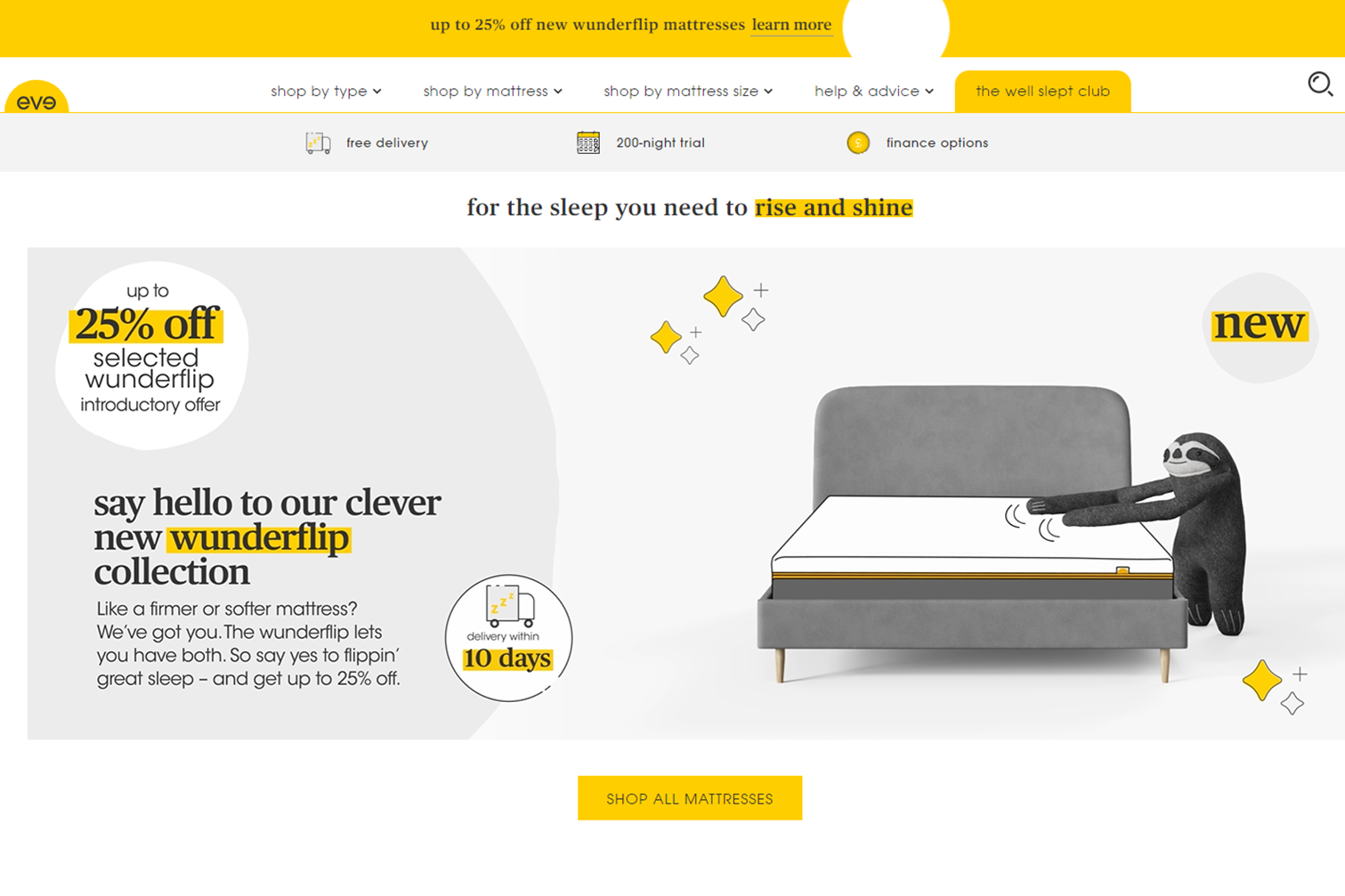
“We believe that we had an opportunity to acquire the brand, help build on the strengths of what they’d created but actually utilise the assets that already existed within Bensons,” he says, explaining that using its manufacturing, delivery and marketing capabilities freed up of a lot of costs at Eve Sleep.
Collard describes the brand as “complementary” as it helped to introduce a “slightly younger and slightly more urban” customer to Bensons.
“We see it as very complementary. We’ve created an exclusive range of Eve products for Bensons…and we’ve seen some real success from that.”
Last week, Eve relaunched its entire product range after reformulating its mattresses based on customer feedback. The new range will be made exclusively at Bensons for Beds’ Huntingdon manufacturing facility.
Collard says the move marks an “exciting step forward in the Eve story”, and by utilising Bensons’ expertise of the bed sector “we have developed a groundbreaking and innovative range of mattresses that is market leading and will really set Eve apart from the competition”.
Phase 2 of the turnaround
With the business back in positive EBITDA, Collard is keen to accelarate its turnaround efforts and return the business to the foothold it once held in the UK furniture market.
The chief executive explains there are three key pillars to his growth plans in the next 12 months.
The first is pushing ahead with its strategy of “unlocking the power of our people”, which Collard believes is “absolutely key for us to be able to be even more successful in this market”. This includes continued investment in sales, product and customer service training.
The second thing is continuing to build scale and “offer more people an opportunity to visit a Benson store”, he says.
“Bensons historically has had over 200 stores in the UK and at the moment, we’re just around 170. Our ambition over the next couple of years is to try to close that gap and reach a target of over 200 stores.”
“There are lots of territories historically that Bensons has operated in and operated profitably, but because of some of the history of the business, we’ve moved out of those.”
Collard says the business is targeting 15 net openings this year and between 15 to 20 the following year to close the gap.
“One of the areas we are focused on is within the M25 where there are less big retail parks and we believe there are more opportunities as to how we bring Bensons to some of those communities.”
He adds that there’s an opportunity for the retailer to trial smaller format stores for inner city locations, but that would likely begin early next year.
Collard puts innovation as the retailer’s third pillar.
“In the end, we’re a bed specialist. And if you are a specialist, the reason is people come to you because they believe that you offer a differentiated service, but you also offer a differentiated broader range of innovative products.”
“That’s not just in mattresses. That’s around bedframes, how we offer customers some of those products, and the wider services that we also provide.”
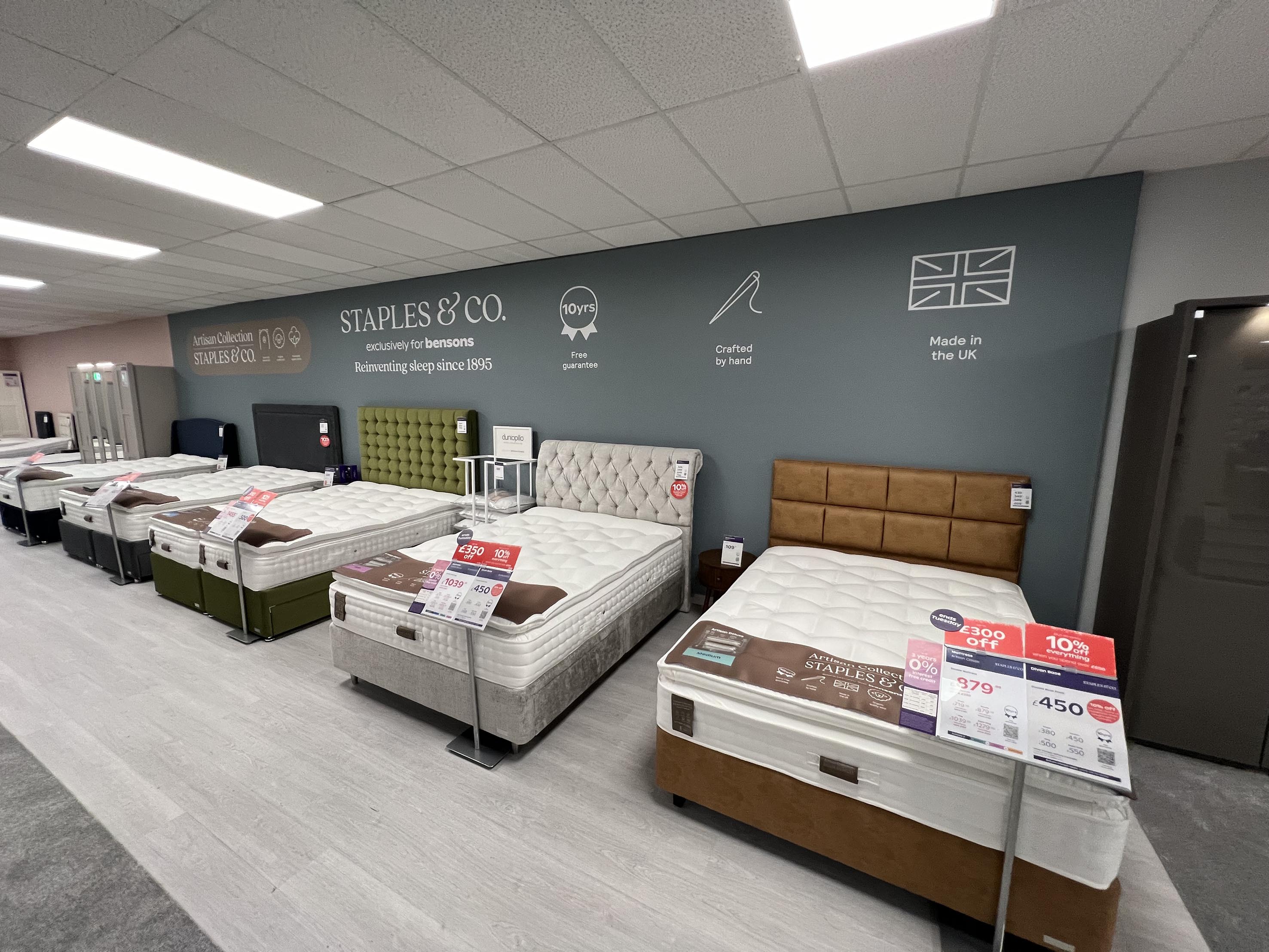
Collard is also looking at opportunities to develop an assembly and removal service for customers, explaining that he hopes Bensons will be able to provide a “sort of 360 degree offer” where it is able to deliver and assemble the order, as well as help disassemble and take away unwanted old furniture.
“Our recycling services, we believe are sector leading, and we’ve got some good assembly products, but we want to do even more in that space,” he says.
Collard is hopeful that the Bensons for Beds will continue its positive momentum, despite forecasting another year of a “quite subdued market […] until we get to the other side of a general election”.
“‘I’m not expecting any huge recovery this year but the difference for us is that I believe we’re massively under potentialized and so, there is an opportunity, as we have done over the last year, to buck a difficult market.”
Click here to sign up to Retail Gazette‘s free daily email newsletter







